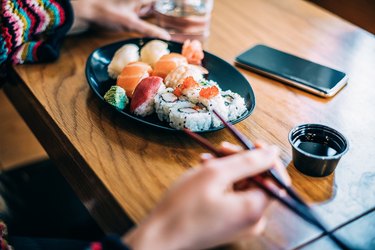
If you're always finding yourself scrounging around the pantry late at night, you'll first need to ask yourself why this is happening before you can nip the behavior in the bud.
And you may well want to nip it: Depending on what you're snacking on and how much you're eating, your after-dinner habit could lead to weight gain and digestion issues like heartburn, which also affects the quality of your sleep, per the Mayo Clinic.
Video of the Day
Video of the Day
There are two common drivers when it comes to late-night snacking:
Emotional snacking: Does snacking on cookies while watching TV or scrolling through your phone sound familiar? We tend to snack at night because we're bored, stressed or tired. This type of emotionally driven eating can lead to weight gain because your body isn't actually hungry or in need of more energy. Plus, it's likely you are mindlessly snacking in these situations, which means you're probably ignoring any hunger cues telling you that you've had enough.
Physical hunger snacking: Do you eat "good" all day only to come home and continually feed throughout the night? This is another reason why we snack in the evening — we aren't eating enough and/or eating the right types of foods throughout the day.
With that in mind, here are six ways to stop snacking after dinner.
1. Reduce Your Stress Level
When we're constantly stressed, our bodies release cortisol, a hormone that amps up our appetite. This can lead to overeating — like those late-night nosh sessions — which in turn can cause you to gain weight, according to Harvard Health Publishing.
Try proven stress-reducing methods like yoga, meditation or exercise, or find social support through a friend or therapist.
Related Reading
2. Go for a Walk
If boredom is leading you to the kitchen cupboards after dinner, getting out of the house and going for a walk can be an easy fix. Doing so literally removes you from the situation and allows you to get in some exercise and fresh air.
Walking can also lower your stress levels, per the Mayo Clinic, which is helpful overall, but especially if it's contributing to your nighttime snacking.
Related Reading
3. Eat Enough at Dinner
There are benefits to eating a lighter dinner, especially when it comes to managing your weight. A small February 2020 study in the Journal of Clinical Endocrinology & Metabolism found that eating the bulk of your calories earlier in the day and fewer at night led to a higher calorie burn overall.
But all of this is irrelevant if you're still hungry post-dinner, which leads you to snack all night. Make sure you're eating enough at dinnertime to ensure you're left feeling full and satisfied.
Remember that it's not just food quantity that matters, but the quality of what you're eating. Prioritize protein at your evening meal, since protein is the most satiating of the macronutrients (the other two being carbs and fat), according to The American Journal of Clinical Nutrition. Examples of high-protein foods that are relatively low in calories include black beans, tempeh, tuna, chicken breast and shrimp.
Ready to Lose Weight?
Set yourself up for success with LIVESTRONG.com's Weight-Loss Kickstart program.
4. Make Sure You’re Getting Enough Sleep
When we don't get enough good, quality sleep, our health takes a hit. One immediate effect is on our appetite.
A lack of shut-eye causes ghrelin — a hormone that stimulates hunger — to increase, while simultaneously decreasing levels of leptin, a hormone that promotes satiety, according to Harvard Health Publishing.
Compounding this is the finding that losing sleep leads to craving foods rich in fat and carbs, according to a March 2016 Sleep study.
Related Reading
5. Eat Enough Throughout the Day
Do you try to "eat perfectly" during the day only to find yourself binging on snacks later in the evening?
When we overly restrict ourselves throughout the day, it sets us up for a binge-fest later on. Instead, eat a balanced diet. Aim to include healthy carbs rich in fiber (whole grains, beans, fruits) and lean sources of protein (chicken, eggs, lentils, tofu) at every meal and snack.
6. Allow Yourself to Have a Snack, Without Overthinking
If you find yourself truly hungry after dinner, or if a craving just won't going away, allow yourself to have a snack without any negative feelings attached.
Determine what it is you really want and eat it, but keep your portions in check. Remember that eating larger amounts of food before bed can disrupt your sleep and cause digestion issues.
Most importantly, be mindful that this isn't a habit you're creating.
Related Reading
- Mayo Clinic: "Heartburn"
- Harvard Health Publishing: "Why Stress Causes People to Overeat"
- Journal of Clinical Endocrinology & Metabolism: "Twice as High Diet-Induced Thermogenesis After Breakfast vs Dinner On High-Calorie as Well as Low-Calorie Meals"
- Harvard Health Publishing: "3 Ways Decreased Sleep Contributes to Overeating"
- Mayo Clinic: "Exercise and stress: Get moving to manage stress"
- The American Journal of Clinical Nutrition: "Protein, weight management, and satiety"
- Sleep: "Hungry for Sleep: A Role for Endocannabinoids?"
Was this article helpful?
150 Characters Max
0/150
Thank you for sharing!
Thank you for your feedback!